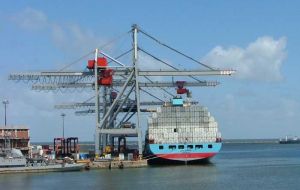MercoPress. South Atlantic News Agency
Investment and exports behind Uruguay's growth

Productive investment and exports have been behind the sustained growth of the Uruguayan economy since the crisis of 2002, according to Fernando Lorenzo head of the Macroeconomic and Financial Advisors Office from the country's Ministry of Economy.
"Exports have increased vigorously with new historic records in value and volume", said Lorenzo who added that investment in Uruguay has continued to grow in spite of the conclusion of the building of the Botnia pulp mill complex, the country's major investment in recent history, equivalent to over 1.2 billion US dollars. "Investment and exports have also made Uruguay far less vulnerable to outside financial shocks", quite a difference from what happened in 2002 when the collapse and melting of neighboring Argentina's economy and default cost Uruguay a 25% retraction of its GDP. Lorenzo also pointed out to domestic demand, private consumption, which has been lately growing at similar percentages as the economy's expansion. The strong performance of the Uruguayan economy has also helped lower unemployment to unheard rates in the last decade of 8%, with a sustained creation of jobs and improvement of pay rates. As to the possible impact of the world's slowdown and financial repercussions of a recession in the US, Lorenzo said "effects would be moderate, both in trade and financial terms". He added that Uruguay has a more diversified foreign trade with other market options and a comfortable re scheduled foreign debt until at least 2010, plus sufficient liquidity. Regarding inflation, Lorenzo said it reflects increases in specific items, particularly fresh goods and fuel, of which Uruguay is a net importer.




Top Comments
Disclaimer & comment rulesCommenting for this story is now closed.
If you have a Facebook account, become a fan and comment on our Facebook Page!